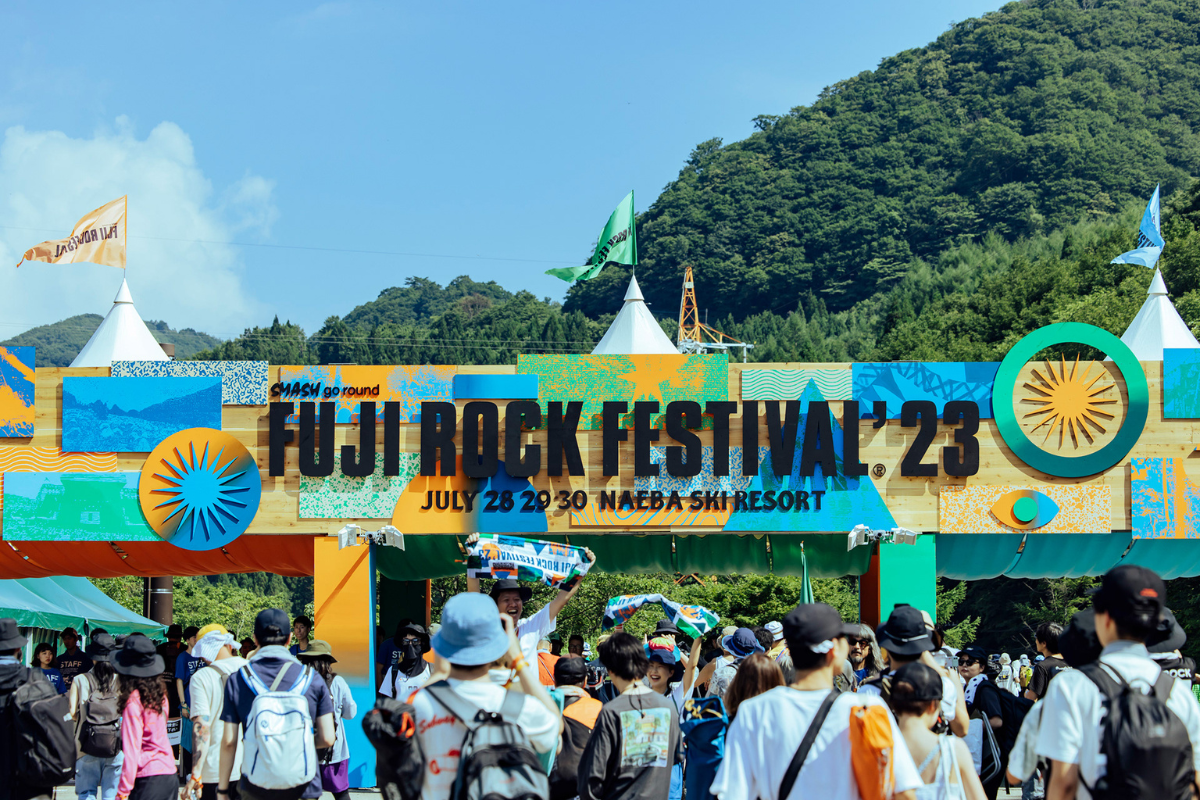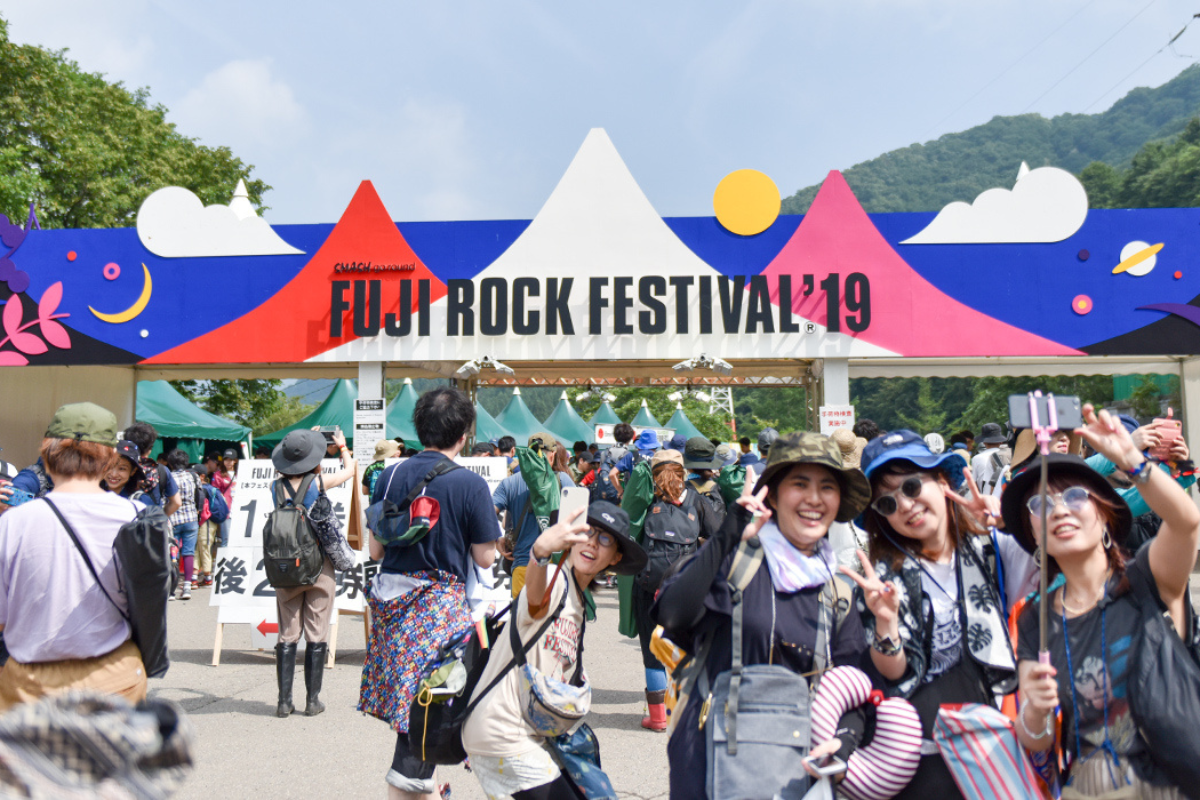In the heart of Japan’s breathtaking Niigata Prefecture, nestled within the Naeba Ski Resort, a musical phenomenon unfolds each summer. It’s Fuji Rock Festival, a three-day extravaganza that stands as Japan’s largest and most beloved outdoor music event. This iconic festival isn’t just about the music. It is a tapestry of electrifying energy, cross-cultural connections, and a deep respect for nature.

Photo: Behance
In the lush foothills of Japan’s Mount Fuji, nestled within the picturesque Naeba Ski Resort, a different kind of energy takes hold each summer. The air vibrates with the anticipation of thousands as Fuji Rock Festival, the largest outdoor music event in the country, descends upon the serene landscape. It’s a captivating union of world-class music, a stunning natural backdrop, and a unique sense of community that draws music lovers from Japan and across the globe.
Fuji Rock Festival’s roots stretch back to 1997, a time when Japan’s music scene was primarily focused indoors. Inspired by iconic festivals like Glastonbury, the organizers envisioned an event that would break the mold and celebrate music in the embrace of nature. The inaugural festival, held at the base of Mount Fuji, faced logistical challenges but cemented the core spirit that still defines Fuji Rock today. Over the years, the festival has moved to its current home in Naeba and weathered everything from typhoons to temporary hiatuses, emerging each time with a renewed sense of purpose.
Boasting multiple stages, Fuji Rock showcases a staggering lineup of over 200 Japanese and international artists. The Green Stage, the festival’s main attraction, has hosted legends like Red Hot Chili Peppers, Bob Dylan, Foo Fighters, and countless others. The White Stage offers a mix of established acts and rising stars, while the Red Marquee pulsates with electronic beats and experimental sounds. But Fuji Rock’s magic isn’t limited to just the big stages. Intimate venues like the Gypsy Avalon and quirky spots like the Rookie A Go-Go stage provide unexpected discoveries and a chance to connect with the next generation of musicians.

Photo: JAPAN Forward
The diversity of Fuji Rock’s musical landscape is its hallmark. Rock music reigns supreme, but the festival seamlessly weaves in genres like pop, hip-hop, electronic, folk, and even traditional Japanese music. It’s a melting pot of sounds that caters to the seasoned music aficionado as much as the casual listener seeking to broaden their horizons.
Beyond the music: A festival experience
Fuji Rock’s appeal lies not only in the music but also in the overall experience. The breathtaking natural setting is a major part of the draw. Lush greenery, rolling hills, and the majestic presence of Mount Fuji in the distance create a sense of escape and wonder. The festival site is also remarkably clean, a testament to the environmentally conscious ethos fostered by the organizers and embraced by the attendees.
Between sets, festival-goers can explore a variety of attractions. The vibrant “Oasis” area offers food stalls serving delicious Japanese and international cuisine, quirky shops selling eclectic merchandise, and chill-out spots to rest and recharge. Art installations dot the landscape, adding another layer of creativity to the environment. For those seeking a more immersive experience, camping options in designated areas allow visitors to truly become one with the festival rhythm.
One of the most endearing aspects of Fuji Rock is the palpable sense of community. There’s a shared respect among attendees, an unspoken agreement to leave negativity behind and embrace the spirit of celebration. Seasoned Fuji Rock veterans welcome newcomers with open arms, sharing tips and creating a welcoming space for all. The crowd’s enthusiasm is infectious, with joyful singing, uninhibited dancing, and a contagious sense of camaraderie filling the air.

Photo: The Japan Times
Fuji Rock: A celebration of music, nature, and sustainability
Nestled amidst the lush beauty of Naeba Ski Resort, Fuji Rock Festival isn’t just about the music; it’s a conscious celebration of music, nature, and the delicate balance between the two. While the festival pulsates with the energy of renowned musicians, it also carries a powerful message of environmental responsibility, making it a leader in the field of sustainable festival experiences.
Fuji Rock embraces a “zero-waste” philosophy, aiming to minimize waste generation and maximize recycling efforts. Extensive recycling stations are distributed throughout the festival site, clearly labeled for different materials like plastic, paper, and food waste. Volunteers play a crucial role in assisting attendees and ensuring proper sorting. This commitment goes beyond just the festival weekend. The organizers collaborate with the non-profit organization, iPledge, to actively educate attendees on waste reduction and responsible disposal throughout the year.
Sustainability efforts extend far beyond recycling bins. The festival actively seeks ways to reduce its environmental footprint. Biodiesel, derived from recycled cooking oil, fuels some of the stages, and solar panels contribute to the energy needs. Additionally, the festival discourages single-use plastics by incentivizing reusable water bottles and promoting food vendors who utilize eco-friendly packaging.

Photo: Fuji Rock
The festival’s location, nestled within a pristine natural environment, plays a vital role in its message. Respect for nature is interwoven into the fabric of the event. The festival organizers work closely with the Naeba Ski Resort to ensure minimal impact on the surrounding ecosystem. Local flora and fauna are protected, and strict guidelines are in place to minimize noise pollution.
Fuji Rock’s commitment to sustainability doesn’t exist in a vacuum. The festival serves as a powerful example for the music industry and beyond. It sets a precedent for responsible event management, inspiring other organizers to adopt sustainable practices. Additionally, it fosters environmental consciousness among attendees, many of whom carry the lessons learned at Fuji Rock into their daily lives.
The festival’s commitment extends beyond the three-day event. The organizers work year-round with environmental groups and local communities to promote sustainable practices. They also invest in initiatives like tree planting and local habitat conservation. These efforts demonstrate a long-term commitment to environmental responsibility that goes far beyond the festival gates.

